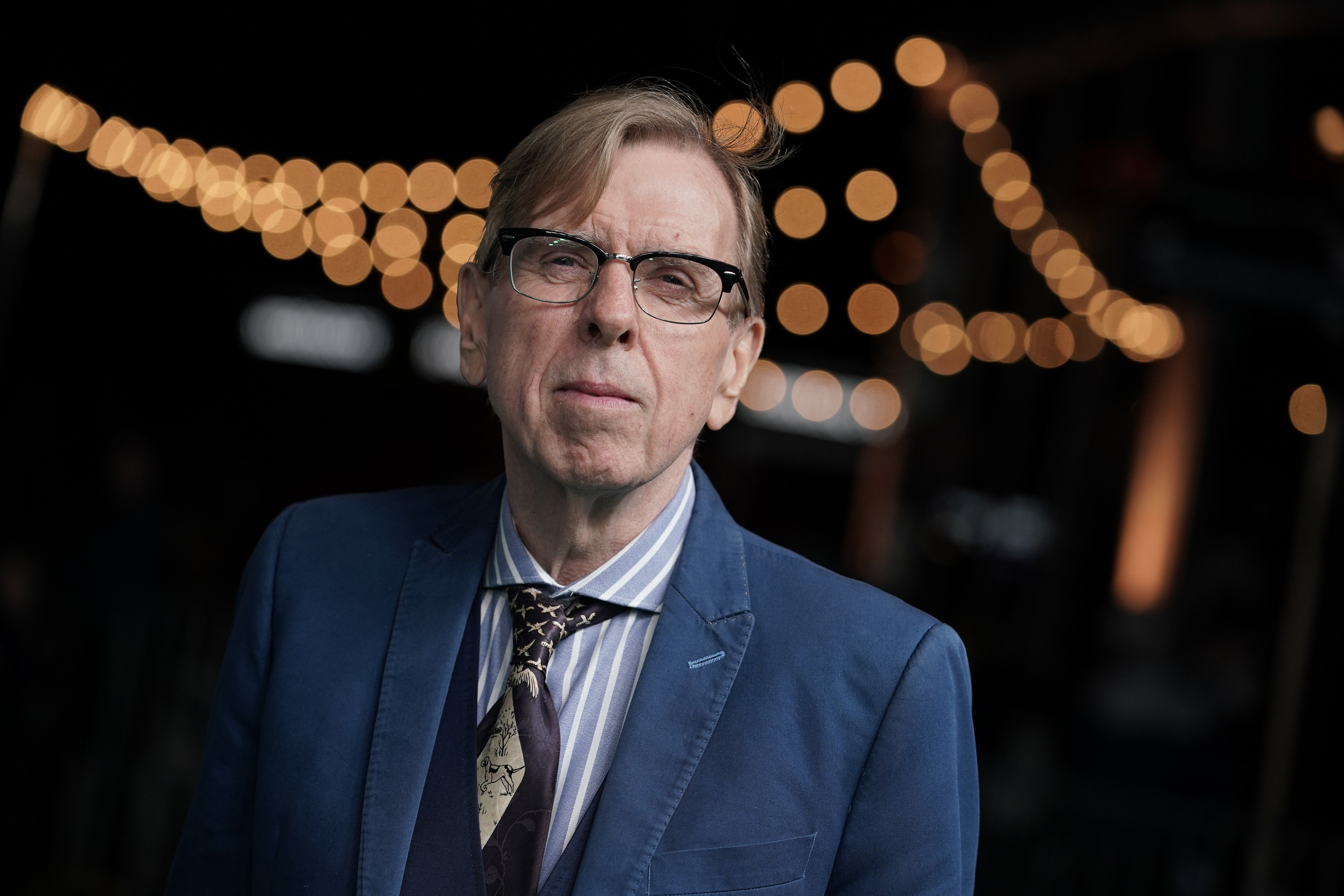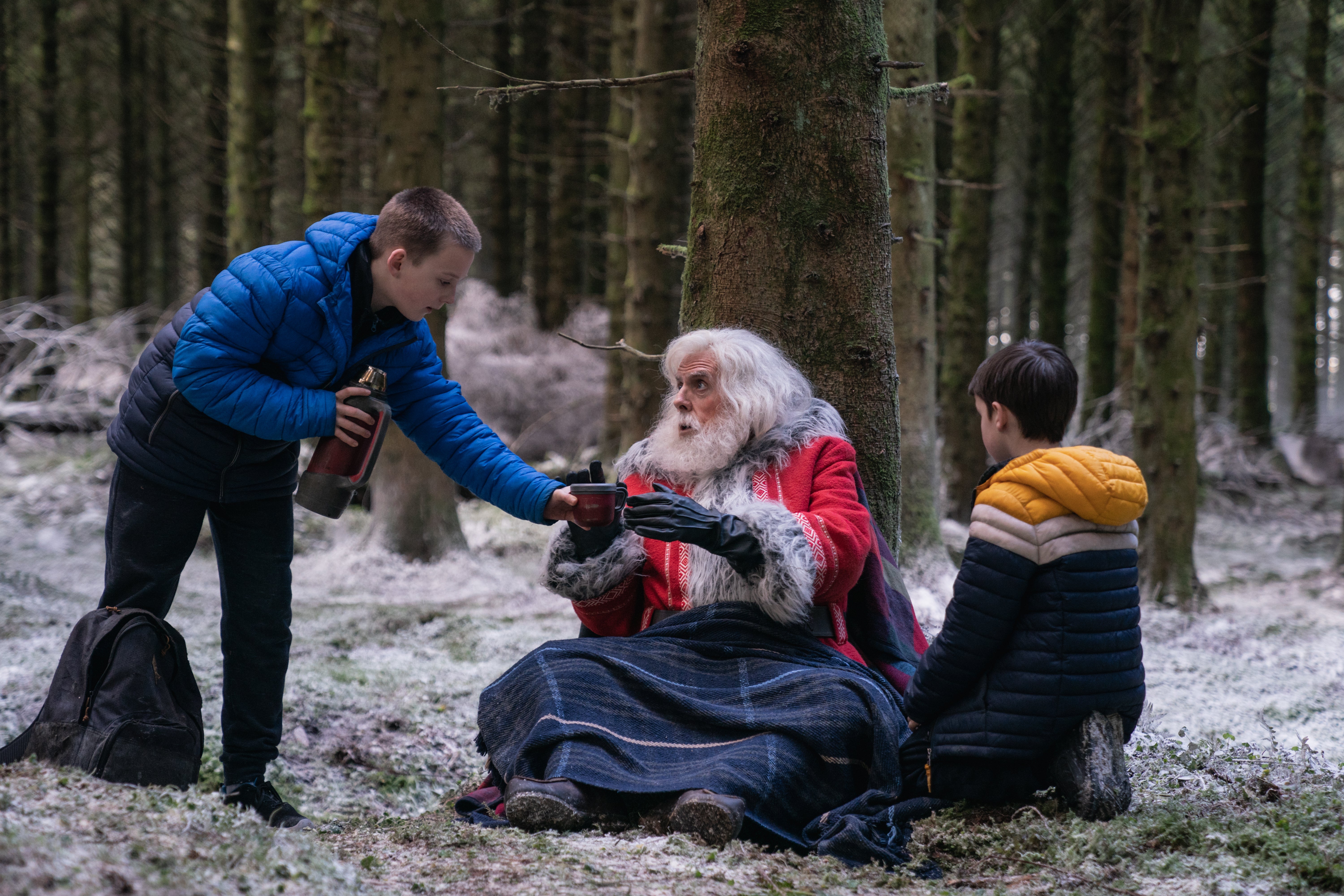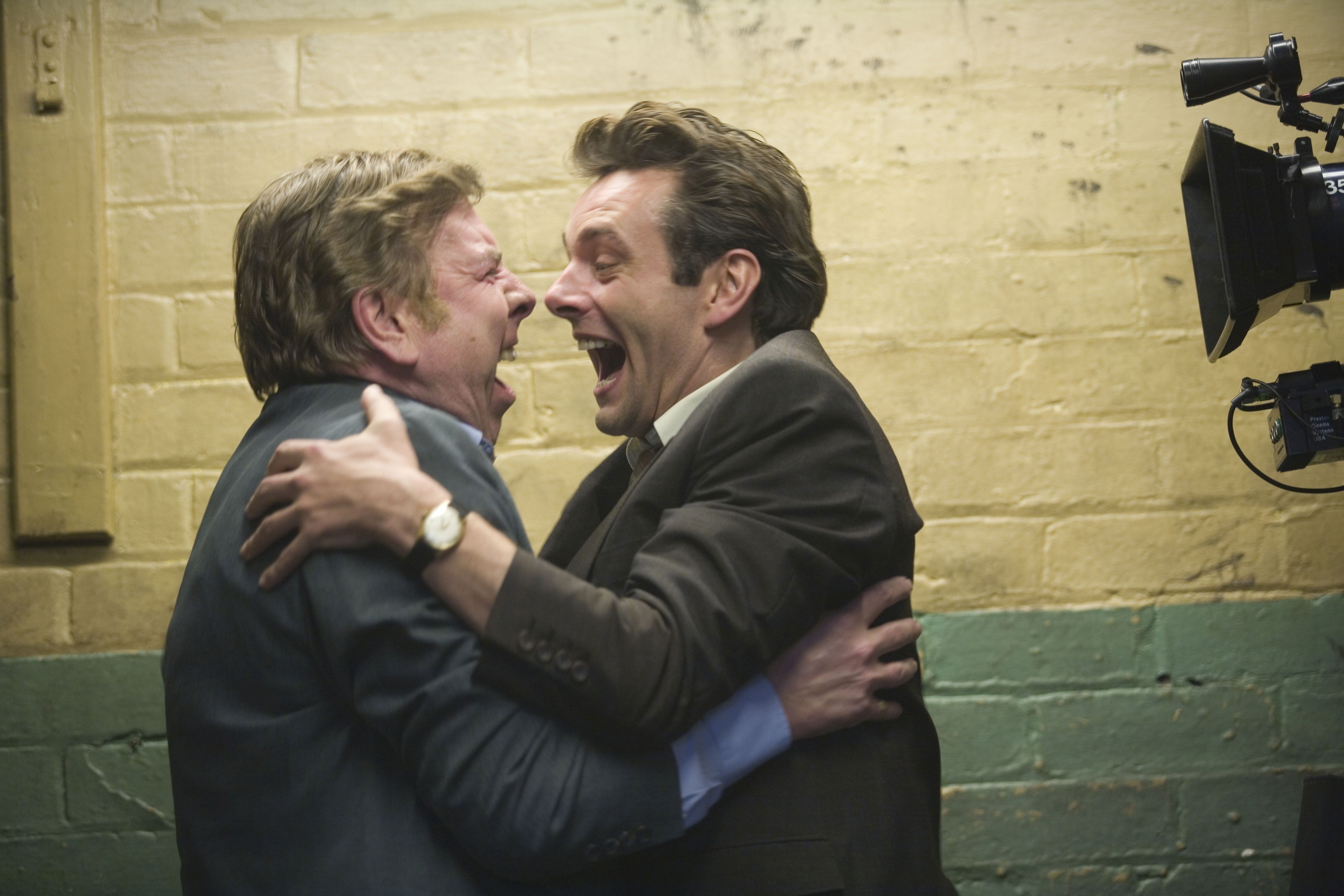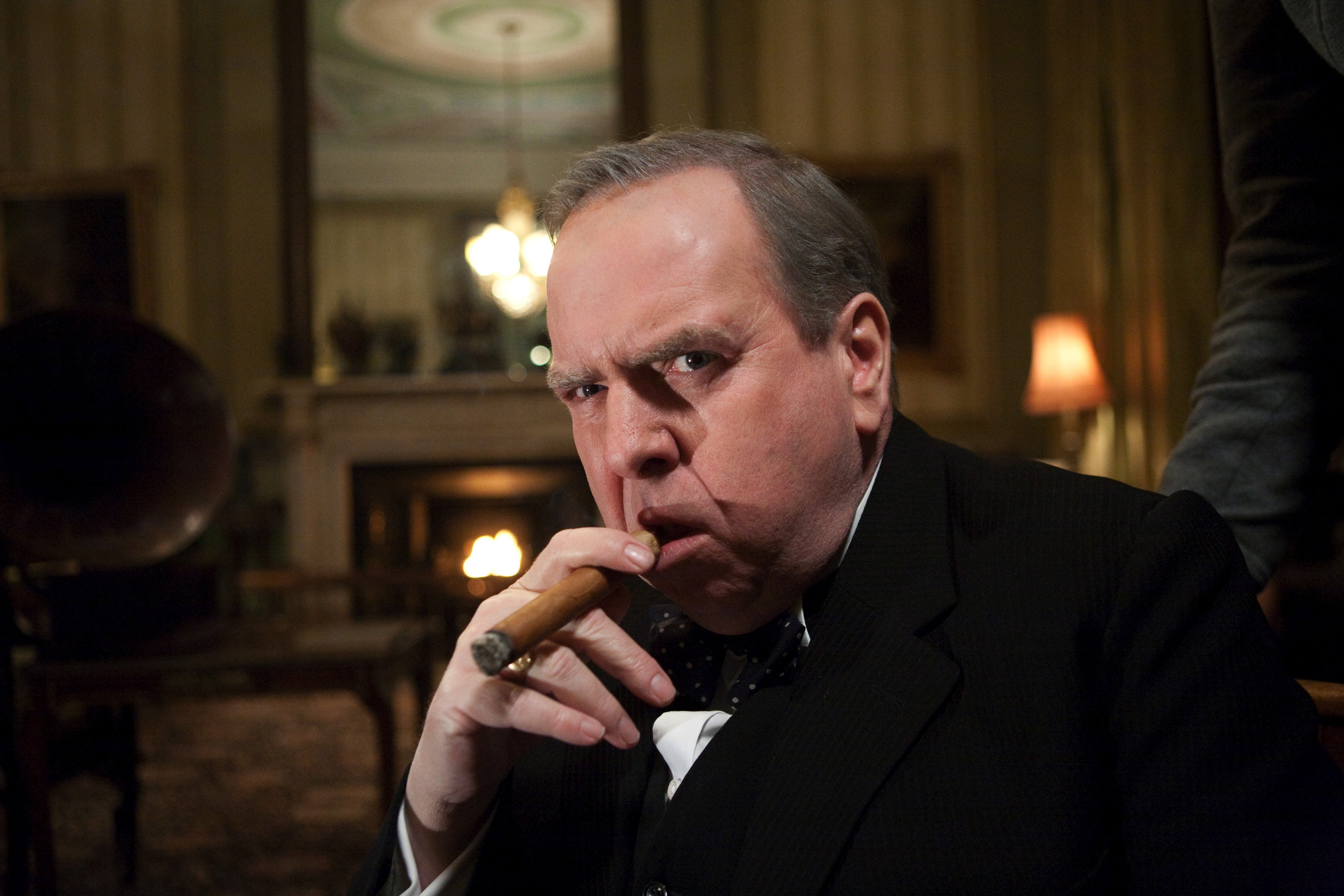Timothy Spall: ‘England is a much less equal society than it was in the 1960s – it’s alarming’
The much-loved Harry Potter actor has played everyone from Winston Churchill to JMW Turner. As he prepares to take on Santa Claus in a new Sky comedy drama, he talks to Chris Harvey about the cost of living crisis, his recovery from leukaemia, wild days in the drinking dens of Soho – and why he won’t be touching a drop during this year’s family Christmas gathering (with his three children and seven grandchildren!)

What I must remember to tell you,” says Timothy Spall, “is that I am a Christmas. My father’s mother’s name was Margaret Christmas, so there you go.” I’m on a video call with one of Britain’s great actors; he’s at home in central London, dressed in a black-and-fawn hooped sweater, surrounded by books and paintings, with sunlight from a high window tripping towards his face. He’s in a playful mood. I realise I may have spoken to him more times than I have any of his contemporaries. “Well, we must have a high tolerance level of each other,” he quips.
Over his long career, Spall seems to have played every type of character imaginable, from the ratty Peter Pettigrew in the Harry Potter films to Britain’s last hangman in the 2005 film Pierrepoint, from the painters JMW Turner and LS Lowry to football coach Peter Taylor in The Damned United (2009), from Winston Churchill in The King’s Speech (2010) to the Holocaust denier David Irving in Denial (2016). He’s performed for Bernardo Bertolucci, Tim Burton and Mike Leigh, acted with everyone from Judi Dench to Tom Cruise to Sting (in 1979’s Quadrophenia). But this Christmas, at the age of 66, he’s playing a version of Santa for the first time. “So many brilliant actors have played him before me,” he says, “it’s a bit like Churchill. You go, ‘Whoa, what am I going to do?’”
He’s starring in Sky Max’s feature-length Christmas Eve drama The Heist Before Christmas. It’s set near Belfast, where single mum Patricia (Laura Donnelly) is struggling to make enough from her job at the local Stuff for a Pound store to celebrate Christmas at all. Her younger son’s dream of a bike is out of reach, while his brother, 12-year-old Mikey (Bamber Todd), has given up believing in miracles and is going seriously off the rails. When Mikey sees a man dressed as Santa (James Nesbitt) rob a bank and escape into the woods with a binbag full of cash, he hatches a plan and follows him. But there, in the snow, he runs into another Santa (Spall) who apparently speaks Norwegian and claims to have fallen from his sleigh. The two men find themselves in a good Santa/bad Santa standoff.
The comedy drama tackles the cost of living crisis, which has blighted so many lives, head-on, while exploring the magic of Christmas. “It’s original and daring in the way that it combines aspects of social commentary with entertainment,” Spall says. “It takes a lot of bottle to do that. You go ‘Actually that shouldn’t work,’ but it really does.”
Spall was born in 1957 and grew up in Battersea, south London, where his mum ran her own hairdressing salon and his father worked for the Post Office. Having grown up in the Sixties, Spall believes that Britain has gone backwards towards a more unequal society. “It’s the first time in 100 years or so where, in certain demographics, our children won’t be expected to live as long as us, and they might not have an opportunity to be socially upwardly mobile, which is alarming when you think of all the advances technologically, the so-called information age, the accessibility of knowledge; it seems like a real disconnect.”
The gulf between the haves and have-nots hits hard at Christmas, he says, because “the thing is – and I know this, obviously, being from a working-class background – that working-class people tend to lavish each other with presents a lot more. I’m not being an inverted snob here. Middle-class, upper-class people tend to furnish each other with gifts. Working-class people are lavish with gifts, and the trouble is, that means you’re going to have to buy quite a lot for your kids.”
“I’m not an economist,” he adds, “but I know it’s gonna be tough for some people this year.”
As ever with Spall, he put a lot of thought into playing Father Christmas. He’s been doing background research ever since he played Alfred Doolittle in My Fair Lady at school and jumped on a bus to check out Tottenham Court Road because it was mentioned in the play. For his Santa, he worked out a “grid system of motivation”. He’s “not the confident type” we’re used to, Spall says; there’s a little bit of Clarence the angel from It’s a Wonderful Life in him, a childlike quality infused with wisdom and warmth.

He’s an actor who reads his reviews, and feels hurt sometimes, but he’s not convinced that the critics always get it right. Olivier got some stinkers, he notes. Independent films, such as his recent Bolan’s Shoes, rely so much on the reactions they get, he says, while even some of his favourite movies get short shrift. “I watched [Adam McKay’s apocalyptic comedy] Don’t Look Up, and [La La Land director Damien Chazelle’s] Babylon, which is one of my favourite films of the last few years, and I thought, what’s the matter with you? These films are brilliant.”
He did get great reviews for his portrait of the university lecturer Peter Farquhar in BBC One’s The Sixth Commandment – the real-life story of how twentysomething student Benjamin Field wormed his way into the respected academic’s affections, formed a civil partnership with him, then murdered him for his money. Spall confesses he was “surprised that it affected people so deeply, that they were touched by it”. They came up to him in the street to tell him so.
“That hasn’t happened for years,” he says. “It was almost like the way old telly used to affect people.” By “old telly”, he means from the era before everyone had phones and multiple screens on which we are “all stars of our own lives”. He thinks the drama was shot in an “old-fashioned, unshowy way, too... back to what the BBC has always done best”.
Spall’s own Christmases are a little different now that he has seven grandchildren. He and his wife Shane married in 1981, and have three grown-up children: Pascale, Mercedes, and fellow actor Rafe Spall. They always used to host a big family gathering at home, but “now we just sit around like a pair of old farts waiting to see where we’re going to be invited. We go with the flow, you know, but the Christmas list has got longer.”
He jokingly refers to the festive period as “the fortnight of a thousand Sundays”. Is talking shop forbidden when he and Rafe get together at Christmas time? “No, that’s what we do,” he says. “That’s what our lives are. He’s grown up with that, with an actor as a dad, and all my mates are actors and writers, so that’s a normal thing. There’s a lot of fun to be had. We don’t sit around talking about Dostoevsky very often.”
Our industry is sometimes depicted as a minefield of hate and loathing and paranoia, but that’s not the business I recognise
Spall famously changed his appearance as an actor by losing a lot of weight back in 2014, which he achieved, he said then, partly by giving up wine. Does he take the brakes off at Christmas? “No, I don’t,” he says. “I enjoy myself. I just don’t drink. That’s it. And it’s great. I had my turn. I had a good time, and I no longer do it. And it’s opened up other avenues. I get a lot more done.”
For a period early in his career, Spall was a treasured habitué of some famous Soho drinking dens. In fact, he tells me, this Christmas, on the radio, he’s playing the painter Francis Bacon, “who I knew a little bit – I was a member of the Colony Club. And you weren’t even allowed to mention Christmas there. There would be a groan and a grunt. No one was encouraged to celebrate it; it was like, turn the cross upside down. It wasn’t so much that they were satanists, more that they were nihilists, and I think it was a reaction to the bulls*** stuff that often comes with it.

“I’m not bah humbug about it myself,” he adds, “because I enjoy it. There’s nothing better than giving a kid a present and seeing that joy.” In wider ways, he sees it as a time that involves “an opening up of the heart”. I wonder if Christmas brings home to him how close he came to not being here with his family, after he developed acute myeloid leukaemia in 1996. When we talked about his illness a few years ago, he described how, when a bone marrow transplant had appeared to be his final option, he had woken up one morning and looked down from an upstairs window. “My wife was in the garden,” he said then, “and I was right at the top of the house. I could see her, and I just thought, ‘F*** this!’ I got up and I walked down. And I said, ‘I just wanna let you know, I’m not going to die.’”
Ultimately, he recovered with the help of chemotherapy, but that experience, he says, “is always there. It gives you an idea of concentrating on what is and what isn’t important. Also, we get older, so we’re in the shooting range at the moment, where you’ve lost friends and friends are ill. So this time is cherishable.”
Among the friends he’s lost this year are Michael Gambon, with whom he appeared many times, and Julian Sands (“God rest his soul,” Spall says), who disappeared in January while hiking in California; his body was discovered six months later. He and Sands were in Ken Russell’s Gothic together back in 1986, with Sands playing the poet Percy Bysshe Shelley and Spall the author of The Vampyre, Dr John Polidori.

So much affection for other actors flows from him. I wonder how he feels when someone he’s loved working with becomes mired in scandal, as has happened to Gérard Depardieu (with whom he shared the screen in Vatel in 2000), who has been accused of a historic rape, or Johnny Depp (whom he joined in 2007’s Sweeney Todd: The Demon Barber of Fleet Street). “I feel saddened by it,” he says. Injustices need to be called out, he notes, and actors in general have become more conscious of their behaviour. “It makes you aware that you have to think about what is and what isn’t offensive. But on the whole, I find the atmosphere on 99.9 per cent of films, even when they aren’t fun... there’s always such a deep respect.”
Sometimes, from the way it’s reported, he says, it can feel like the world he moves in is a “minefield of hate and loathing and paranoia, but that’s not the business I recognise... you could call me Pollyanna-ish or even Panglossian about this, and I do insist naturally on accentuating the positive in life, but I don’t have to work too hard on it.”
He’s not someone who takes his talent for granted, though. When he got the letter telling him he’d got into Rada in 1975, he recalls, “I was so over the moon, I couldn’t believe it. And I spent the next six months before I went there thinking they must have made a mistake. I kept thinking, I’m gonna turn up and they’re gonna go, ‘No, no, not you, the other Timothy Spall.’” Once there, he won the coveted Bancroft medal. “Oh, I often wear that to auditions,” he deadpans. Wry humour runs through any conversation with Spall. It’s easy to forget, since he began focusing on serious dramatic roles, just how funny he can be. His hairdresser Aubrey in Mike Leigh’s Life Is Sweet is one of the great comic creations.

For a time, Spall was almost a muse for Leigh, appearing in six of his films, including Secrets & Lies and Mr Turner. He seemed to graduate to Leigh’s company almost from the Royal Shakespeare Company, which he joined post-Rada after a period at Birmingham Rep. He’s just returned to those early roots, playing Polonius in a new film version of Hamlet with Riz Ahmed. “It’s a really interesting project,” he says, “with Hamlet and his family as south Asian. You have to get your Shakespeare chops going again.” (He was in Kenneth Branagh’s 1996 Hamlet, too, as the villainous Rosencrantz, as well as the same director’s Love’s Labour’s Lost in 2000.)
He’s as busy as ever. An exhibition of his landscape paintings, Winter Sun, closed on Saturday 23 December in London, and he has to be back on set the day after we chat; he’s playing the Duke of Norfolk in the BBC sequel to Wolf Hall (“with the great Mark Rylance; brilliant, lovely man”), based on Hilary Mantel’s The Mirror and the Light. He’s filming it until March. But first, there’s that fortnight of a thousand Sundays to get through. “Merry Christmas,” he says, as he bids farewell.
‘The Heist Before Christmas’ is on Sky Max at 8pm on Christmas Eve






Join our commenting forum
Join thought-provoking conversations, follow other Independent readers and see their replies
Comments